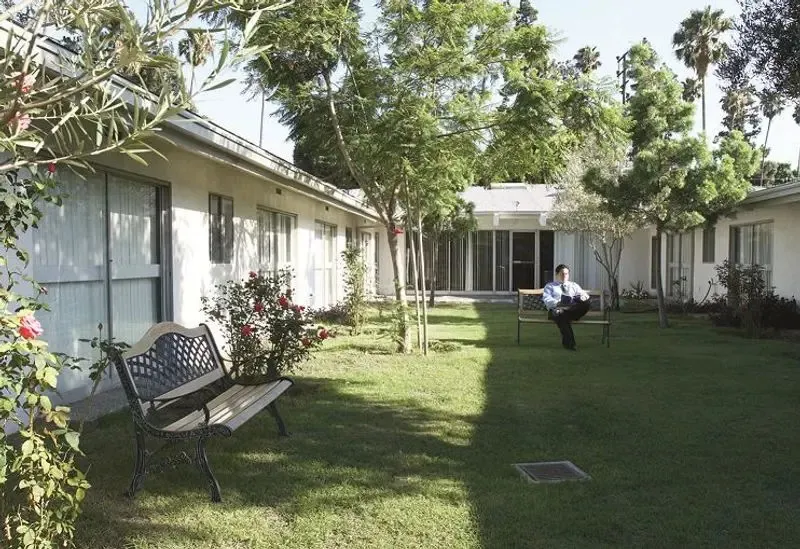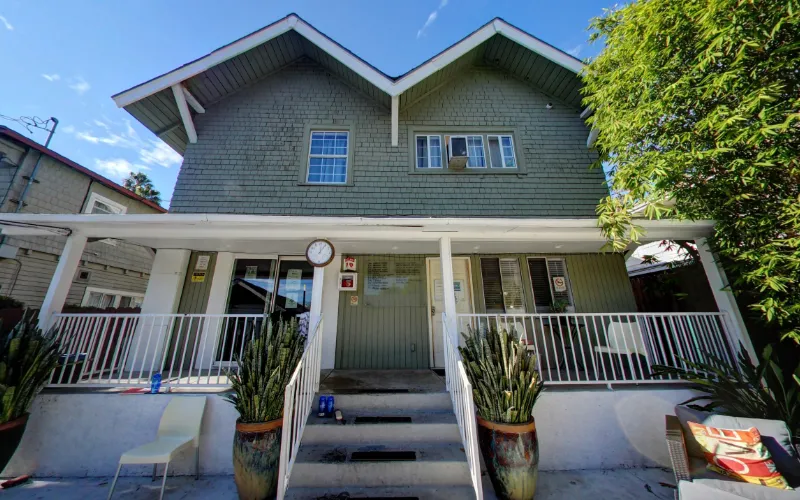Explore inpatient rehab and treatment centers in Los Angeles and nearby cities. This directory connects you with accredited facilities that offer 24/7 care in structured, supportive environments. Ideal for individuals needing intensive support, these residential programs provide therapy, medical supervision, and relapse prevention strategies to address the root causes of addiction, dual diagnosis, and mental health conditions, helping you build a foundation for lasting recovery.
Ads
More Info
Advertisement Disclosure
Our website is funded by advertisers who pay for prominently labeled placements.
Read More157 Rehab Centers were found
Filters
Locations
- Los Angeles(+98)
- Culver City(+14)
- Westlake Village(+13)
- Woodland Hills(+11)
- Beverly Hills(+10)
- Santa Monica(+9)
- Sherman Oaks(+7)
- West Hollywood(+6)
- Malibu(+5)
- Chatsworth(+5)
- Pasadena(+5)
- Encino(+5)
- Redondo Beach(+4)
- Lancaster(+4)
- Reseda(+4)
- Studio City(+4)
- Northridge(+3)
- San Mateo(+3)
- Lynwood(+3)
- Vernon(+3)
- Van Nuys(+3)
- Tarzana(+3)
- North Hollywood(+3)
- Glendale(+3)
- Gardena(+3)
- Riverside(+3)
- Granada Hills(+2)
- Shadow Hills(+2)
- Venice(+2)
- Orange County(+2)
- Pomona(+2)
- West Hills(+2)
- Valley Village(+2)
- Burbank(+2)
- Brentwood(+2)
- Long Beach(+2)
- Sun Valley(+1)
- Torrance(+1)
- San Jacinto(+1)
- San Pedro(+1)
- Upland(+1)
- Whittier(+1)
- Toluca Lake(+1)
- Thousand Oaks(+1)
- Simi Valley(+1)
- Mission Viejo(+1)
- Acton(+1)
- Beaumont(+1)
- Wilmington(+1)
- Panorama City(+1)
- Anaheim(+1)
- Laguna Hills(+1)
- Inglewood(+1)
- Alhambra(+1)
- Rosemead(+1)
- Maywood(+1)
- Manhattan Beach(+1)
- Monterey Park(+1)
- Claremont(+1)
- Covina(+1)
- La Puente(+1)
- Pico Rivera(+1)
- San Fernando(+1)
- Azusa(+1)
- Santa Fe Springs(+1)
- Glendora(+1)
- Agoura Hills(+1)
- El Segundo(+1)
- Duarte(+0)
- Sunland(+0)
- Downey(+0)
- Cudahy(+0)
- El Monte(+0)
- Compton(+0)
- Hermosa Beach(+0)
- Cerritos(+0)
- Calabasas(+0)
- Bellflower(+0)
- Bell Gardens(+0)
- Avalon(+0)
- Arcadia(+0)
- Altadena(+0)
- Paramount(+0)
- South El Monte(+0)
- Walnut(+0)
- West Covina(+0)
- Santa Clarita(+0)
- San Gabriel(+0)
- San Dimas(+0)
- Rolling Hills(+0)
- Orange(+0)
- Hawaiian Gardens(+0)
- Palmdale(+0)
- Norwalk(+0)
- Montebello(+0)
- Lakewood(+0)
- South Pasadena(+0)
- Carson(+0)
- Hawthorne(+0)
Conditions
- Drug(+278)
- Alcohol(+219)
- Mental Health(+195)
- Opioid(+193)
- Cocaine(+184)
- Trauma(+180)
- Methamphetamine(+177)
- Benzodiazepines(+174)
- Heroin(+173)
- Prescription Drugs(+159)
- Depression(+152)
- Anxiety(+149)
- Xanax(+145)
- Synthetic Drugs(+138)
- PTSD(+133)
- Adderall(+131)
- Marijuana(+112)
- Bipolar(+109)
- Ecstasy(+104)
- MDMA(+99)
- Behavioral Health(+93)
- LSD(+93)
- Psychedelics(+91)
- Fentanyl(+71)
- Stress(+71)
- OCD(+69)
- Personality Disorders(+63)
- ADHD(+61)
- Gambling(+38)
- Eating Disorders(+35)
- Anorexia(+34)
- Binge Eating Disorder(+34)
- Bulimia(+33)
- Schizophrenia(+32)
- Gaming(+28)
- Internet Addiction(+27)
- Sex Addiction(+25)
- Burnout(+23)
- Pornography(+22)
- Shopping(+10)
- Narcissism(+8)
Insurances
- BlueCross BlueShield(+129)
- Aetna(+126)
- Anthem(+105)
- Cigna(+105)
- United Healthcare(+66)
- Humana(+63)
- Optum(+53)
- Medicaid(+53)
- MHN(+51)
- Magellan Health(+47)
- Kaiser Permanente(+39)
- Medicare(+31)
- GEHA(+31)
- ComPsych(+29)
- Highmark(+25)
- AmeriHealth(+13)
- Tufts Health(+11)
- Oscar(+9)
- CareFirst(+9)
- Molina Healthcare(+8)
- Intermountain Healthcare(+6)
- Beacon Health Options(+2)
- UMR(+2)
- NYSHIP(+2)
- ILWU(+2)
- Geisinger(+2)
- Empire Life(+2)
- Empire BCBS(+2)
- Bright Health(+2)
- GuideWell(+1)
Therapies

$45,000+ - 30-90 days

$30,000-$50,000

Call for Rates - 30+ days

Call for rates - 7-30 days

$1,000/day - 30+ days

$30,000
Inpatient Rehab Directory for Los Angeles and Nearby Cities
Inpatient treatment, also known as residential rehab, provides a structured and immersive environment for individuals struggling with addiction and mental health disorders. This level of care is designed for those who require 24/7 medical supervision, therapeutic support, and a safe space away from triggers to focus entirely on recovery.
Los Angeles is home to a variety of inpatient rehab centers, from luxury facilities with private accommodations to clinical programs offering intensive therapy and medical care. These programs help clients stabilize their condition, develop effective coping strategies, and prepare for long-term sobriety or mental wellness. Whether you’re seeking help for alcoholism, drug addiction, cocaine use, benzodiazepine dependence, or opioid addiction, there are options available to fit every need.
Understanding Inpatient Treatment
Inpatient rehab means living at a treatment center for a set period, with access to comprehensive therapies including medical detox, individual counseling, group therapy, medication management, and holistic care. Unlike outpatient programs, inpatient treatment removes clients from everyday stressors, reducing exposure to triggers and negative influences that contribute to relapse.
When Inpatient Treatment is Necessary
Inpatient rehab is recommended for individuals who:
- Struggle with severe addiction or frequent relapses
- Experience withdrawal symptoms that require medical supervision
- Have co-occurring mental health disorders such as anxiety, depression, or PTSD
- Have unsuccessfully tried outpatient treatment or other lower levels of care
- Need a structured environment to avoid high-risk situations and triggers
- Experience cravings or behavioral patterns that interfere with everyday functioning
Types of Inpatient Treatment Programs
Los Angeles offers a variety of inpatient treatment programs tailored to different needs.
Short-term inpatient rehab typically lasts 30 days and provides an intensive treatment experience that includes detox, therapy, and relapse prevention planning. This program is best for individuals who need focused support before transitioning into outpatient care.
Long-term residential treatment lasts 60 to 90 days or more, offering in-depth therapy, life skills training, and extended support for individuals with complex addictions or mental health challenges. This approach allows for deeper healing and preparation for reintegration into daily life.
Dual diagnosis inpatient treatment is designed for individuals struggling with both substance use and mental health disorders. These programs offer integrated care, including psychiatric evaluations, medication management, and therapy that addresses both conditions simultaneously.
Luxury and executive inpatient treatment centers provide high-end accommodations, personalized treatment plans, and holistic therapies such as yoga, meditation, and nutritional counseling. These facilities cater to professionals, celebrities, and individuals seeking an upscale rehab experience.
Holistic inpatient treatment programs focus on alternative healing approaches, incorporating mindfulness, acupuncture, fitness, and experiential therapies like equine-assisted therapy and art therapy to support emotional and physical recovery.
Faith-based inpatient rehab centers integrate spiritual or religious components into treatment, providing faith-centered counseling and support for individuals who want to incorporate their beliefs into their recovery journey.
What to Expect in an Inpatient Treatment Program
The structure of inpatient treatment ensures that individuals have a daily schedule filled with therapy, education, and wellness activities.
- Medical and psychiatric evaluations assess overall health, withdrawal symptoms, and any underlying mental health conditions.
- Individual therapy sessions help individuals explore the root causes of addiction or mental health struggles and develop healthier coping mechanisms.
- Group therapy fosters peer support, allowing individuals to share experiences, build connections, and develop communication skills.
- Cognitive behavioral therapy and dialectical behavior therapy help individuals reframe negative thoughts and manage emotional triggers.
- Relapse prevention education provides tools to recognize and manage triggers, cravings, and stressors after treatment.
- Medication management is available for those who need psychiatric medications or medication-assisted treatment for opioid or alcohol dependence.
- Holistic and wellness activities such as yoga, meditation, fitness training, and nutrition counseling support overall well-being and stress reduction.
Benefits of Inpatient Treatment
- Provides a drug- and alcohol-free environment to focus entirely on recovery
- Offers 24/7 medical and therapeutic support for individuals at risk of severe withdrawal or relapse
- Removes external stressors and triggers that may contribute to substance use or mental health struggles
- Creates a structured daily routine to build healthy habits and coping mechanisms
- Allows for deeper emotional healing through therapy and self-discovery
- Strengthens long-term recovery success through intensive treatment and relapse prevention planning
Transitioning from Inpatient Treatment
After completing inpatient rehab, individuals are encouraged to continue their recovery journey through structured aftercare programs. Many inpatient treatment centers in Los Angeles offer step-down programs such as partial hospitalization programs, intensive outpatient programs, or outpatient therapy.
Some individuals transition into sober living homes, which provide a supportive, substance-free environment while allowing them to reintegrate into work, school, and daily life with continued peer support.
Ongoing therapy, 12-step meetings, or alternative support groups such as SMART Recovery help individuals maintain their progress and stay accountable in recovery.
Finding Inpatient Treatment in Los Angeles
Los Angeles has a wide range of inpatient treatment centers, including private rehab facilities, nonprofit treatment programs, and state-funded options. When choosing an inpatient rehab center, it is important to consider factors such as treatment approach, accreditation, staff credentials, and whether the facility accepts insurance or offers financial assistance.
Many treatment centers offer free assessments or consultations to help individuals and their families determine the best level of care for their needs.
Frequently Asked Questions
How long does inpatient treatment last?
What should I bring to inpatient rehab?
Does insurance cover inpatient treatment?
Can family members visit during inpatient treatment?
Ads
More Info
Advertisement Disclosure
Our website is funded by advertisers who pay for prominently labeled placements.
Read More






































